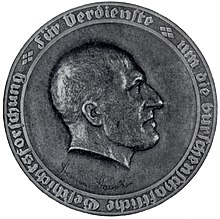Society for fraternity historical research
| Society for fraternity historical research (GfbG) |
|
|---|---|
| purpose | Research and publications on the history of the German unity movement |
| Chair: | Christian Oppermann |
| Establishment date: | April 13, 1909 |
| Seat : | Frankfurt am Main |
| Website: | http://www.burschenschaftsgeschichte.de/ |
The Society for Fraternity History Research e. V. (GfbG) is a history association closely related to the German Burschenschaft with the focus on researching the student history of the Central European cultural area with special consideration of the German unity movement and the role of the fraternity. It was founded on April 13, 1909 in Frankfurt am Main as the Burschenschaftliche Historische Kommission (BHK) and is entered in the register of associations there.
history
The emergence of the GfbG goes back to private collecting. A general collection of fraternity, general student and university studies, begun by Gustav Heinrich Schneider in 1887, was continued by Hugo Böttger and from 1908 looked after by Herman Haupt in the Giessen university library. The GfbG archive and library emerged from this collection.
Together with historians and fraternities interested in history, Haupt founded the Burschenschaftliche Historische Kommission (BHK) in Frankfurt on April 13, 1909 . Initially sponsors were the fraternity associations Deutsche Burschenschaft (DB), Rüdesheimer Verband deutscher Burschenschaften (RVdB) and Burschenschaft der Ostmark (BdO), after RVdB and BdO were absorbed into the DB in 1919, only the DB.
Although the DB thus secured the financial basis of the GfbG, the GfbG was able to evade political co-ordination by the DB. In 1919, Herman Haupt wrote in the preface to Volume 6 of the sources and representations published by the GfbG :
“The 'sources and representations' will in no way take sides in the political contradictions that have divided our people more deeply than ever since the overthrow of our state. As before, they pursue purely scientific goals and will lock the door to party political discussions, even if they appear in scientific guise, as before. "
In 1927 the BHK was renamed the Society for Fraternity History Research, and in 1933 it was entered in the Frankfurt register of associations .
Archive and library
The archive and library of the GfbG are now in the Federal Archives in Koblenz . They have been headed by Harald Lönnecker since 1995 . The stocks cover about 500 running meters.
Friedrich Meinecke was the first director of the archive and library of the BHK, which was founded in 1909 .
In 1939, under pressure from the National Socialist Reichsstudentenführung, the archive and library were transferred from Frankfurt to Würzburg in order to combine them with other collections to form a university studies institute . In 1954 the holdings returned to Frankfurt, where they were incorporated into the Federal Archives. When the Federal Archives in Frankfurt were dissolved, the GfbG's archive and library were finally relocated to the Federal Archives in Koblenz.
Herman Haupt Medal

The highest award of the GfbG is the Herman Main Medal , founded in 1929 and named after the first chairman of the GfbG . It is awarded “for services to the fraternity's historical research”.
Publications
- Sources and representations on the history of the fraternity and the German unity movement , 17 volumes (1910–1940), "Rote Reihe" and "Blaue Reihe" (volumes 6, 9, 11 and 16)
- Representations and sources on the history of the German unity movement in the nineteenth and twentieth centuries , so far 21 volumes (since 1957), "Green Series"
- Biographical Lexicon of the German Burschenschaft , so far Vol. 1: Politicians , so far 8 part volumes (1996-2014), Vol. 2: Artists, so far 2 part volumes (2017/18)
Chairperson
- Herman Haupt (1909–1930)
- Paul Wentzcke (1930–1960)
- Kurt Stephenson (1960-1970)
- Horst Bernhardi (1970–1974)
- Christian Probst (1974–1986)
- Christian Hünemörder (1986-2005)
- Klaus Oldenhage (2005-2017)
- Christian Oppermann (since 2017)
literature
- Harald Lönnecker : "The topic was and remained without parallel appearance in German historical research" - The Burschenschaftliche Historische Kommission (BHK) and the Gesellschaft für Burschenschaftliche Geschichtsforschung e. V. (GfbG) (1898 / 1909-2009). A history of people, institutions and science . Heidelberg 2009.
- Harald Lönnecker: 100 Years Archive and Library of the German Burschenschaft - 100 Years Burschenschaftliche Historische Kommission (BHK) / Society for Burschenschaftliche Geschichtsforschung e. V. (GfbG) . In: Archivist. Journal for Archives 63/2. Düsseldorf 2010. pp. 181-183.
- Harald Lönnecker: Publications of the Society for Burschenschaftliche Geschichtsforschung e. V .. (PDF file; 109 kB). Koblenz 2012.
- Klaus Oldenhage (Ed.): 200 years of fraternity historical research - 100 years of the GfbG - balance sheet and appraisal (PDF file; 638 kB) . Koblenz 2009.
Web links
Individual evidence
- ↑ a b c d burschenschaftsgeschichte.de: Society for Burschenschaftliche Geschichtsforschung eV Archive and library of the German Burschenschaft
- ^ Wolfgang Klötzer : The society for fraternity historical research and its place in the German historiography. In: Klaus Oldenhage (Ed.): 200 years of fraternity historical research - 100 years of the GfbG - balance sheet and appreciation. Koblenz 2009. pp. 129–141, here p. 134.
- ↑ quoted from: Wolfgang Klötzer: The Society for Burschenschaftliche Geschichtsforschung and its place in German historiography. In: Klaus Oldenhage (Ed.): 200 years of fraternity historical research - 100 years of the GfbG - balance sheet and appreciation. Koblenz 2009. pp. 129–141, here p. 134.
- ^ Wolfgang Klötzer: The society for fraternity historical research and its place in the German historiography. In: Klaus Oldenhage (Ed.): 200 years of fraternity historical research - 100 years of the GfbG - balance sheet and appreciation. Koblenz 2009. pp. 129–141, here p. 131.
